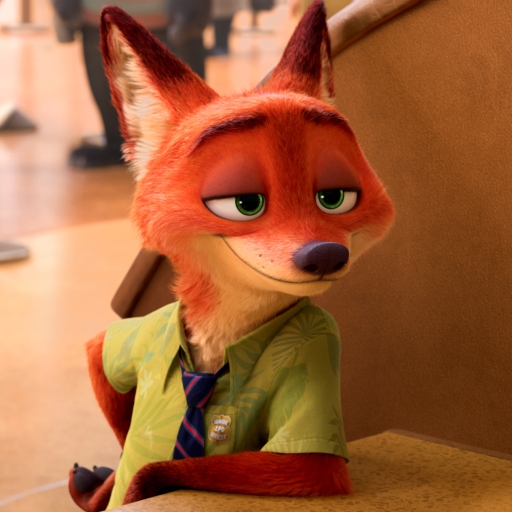We all love animals. Our pets, creatures in nature documentaries, and even the critters in our gardens. But when you’re writing them into your movie- most likely an animation, because as the old mantra goes, “never work with children, water, or animals”- it’s important to remember to keep in mind that they aren’t just human. You can write a very different kind of character.
They can be any of the Nine Character Types- no matter the species, the Character Types always apply. But consider the fact that they are animals will affect how they interact with the world. What their physical capabilities are. How they demonstrate the traits of their Character Type.
Animal motivations and behavior adhere to one of the Nine Character Types, but as these examples demonstrate, the animal’s natural instincts present them with a variety of challenges.e.
Power of Love
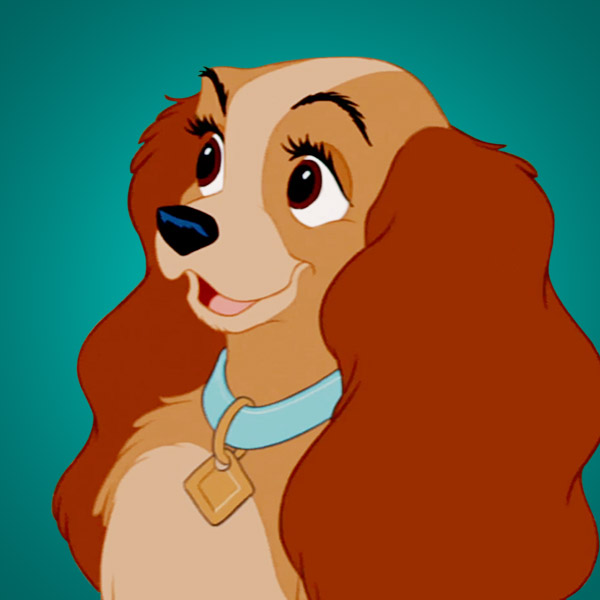
Lady (Barbara Luddy), Lady and the Tramp
Power of Love characters are often mentors, caregivers or parents at their best. They are stalkers and needy codependents at their worst. They see their value in how others love them, and they believe that those they show affection to owe them love in return.
Lady and the Tramp is a classic romantic comedy, and Cocker Spaniel Lady falls for the charming, rough-around-the-edges Tramp (Larry Roberts). Lady is protective of both friends and family alike.
Dogs are incredibly affectionate pets. They are willing to protect those they love no matter the cost. Lady is no exception. She is one of the best examples of a Power of Love animal. Throughout the film, every action she takes is to preserve and to protect her loved ones. Lady demonstrates the positive side of Power of Love.
Power of Imagination
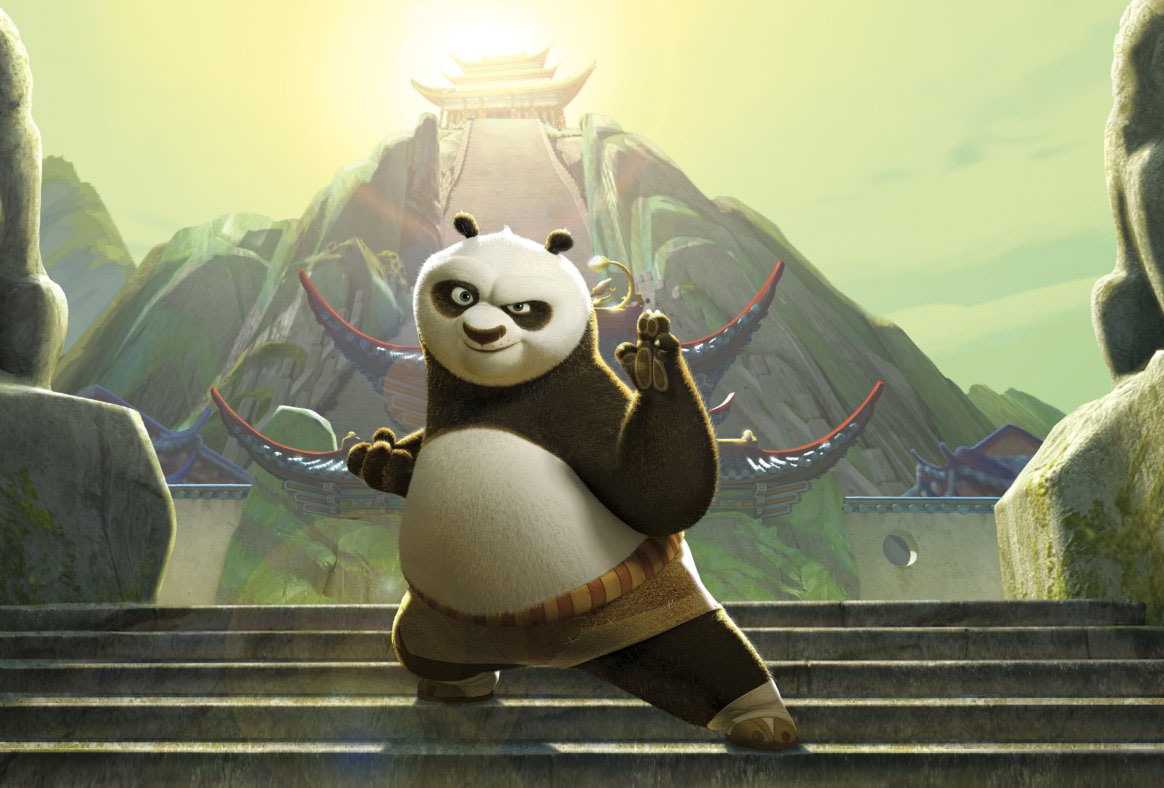 Po (Jack Black), Kung Fu Panda
Po (Jack Black), Kung Fu Panda
Power of Imagination characters are those who are reluctantly called upon to embark on an epic quest or fulfill a destiny thrust upon them. Po is a classic example of an unwitting hero when he is unexpectedly declared the true “Dragon Warrior” of his realm by Master Shifu (Dustin Hoffman).
In contrast to the other Kung Fu warriors, Po is an overweight, food-obsessed Panda whose adoptive father runs a noodle shop. Nothing about him suggests he could be a savior or a warrior. But he brings his fellow Kung Fu masters together and embraces his destiny.
Po headlines a classic Power of Imagination tale, Kung Fu Panda. This is unlikely hero judged for his appearance and his species. He defies the “just a cuddly and peaceful Panda” cliche. Po gives his all as a Power of Imagination character, as he unites his fellow kung fu masters.
Power of Will
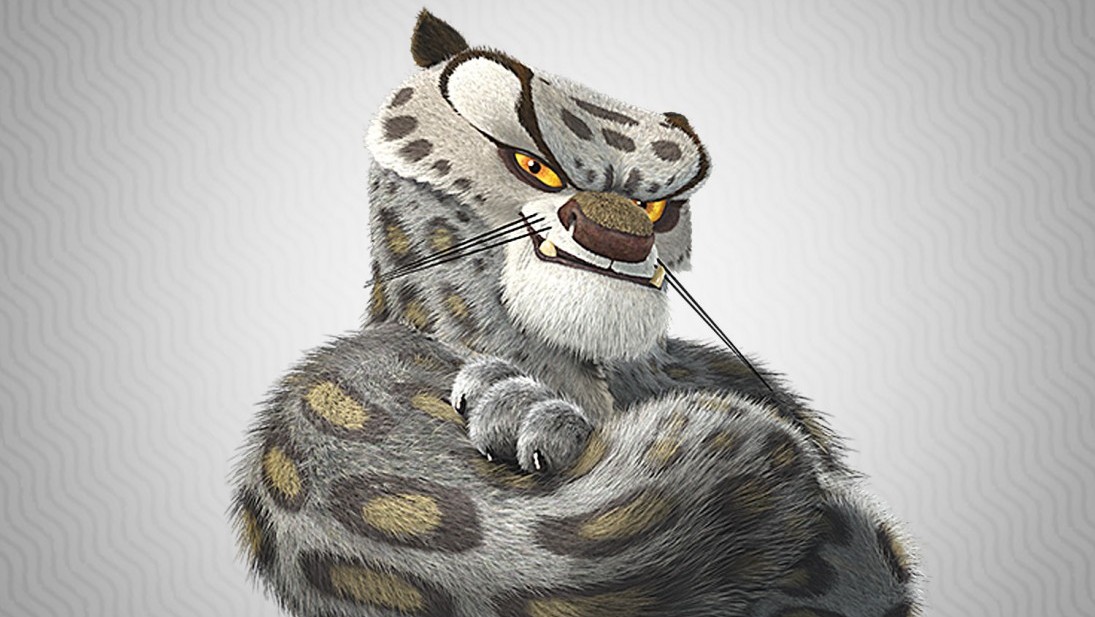 Tai Lung (Ian McShane), Kung Fu Panda
Tai Lung (Ian McShane), Kung Fu Panda
On the flipside of Po is Tai Lung, who was also a protege of Master Shifu. He turned to the Dark Side and his powers for evil. As a Power of Will Character, Tai Lung is interested in control and domination.
Power of Will characters desire is to subjugate and conquer. Tai Lung’s wants to become the Dragon Warrior, for his own selfish reasons.
Unlike Po, Tai Lung is a cat, a snow leopard. His feline tendencies lead to some humorous moments. Power of Will Characters conquer because they fear being vulnerable. We learn that Tai Lung felt abandoned, one of the reasons for his tyrannical tendencies.
Power of Will characters can either be one-dimensional or richly detailed. Tai Lung falls into the latter category. Tai Lung is the perfect foil for Power of Imagination, Po. He mistakes kindness and caring for weakness and assumes an overweight, bumbling Panda could be the Dragon Warrior and defeat him.
Power of Excitement
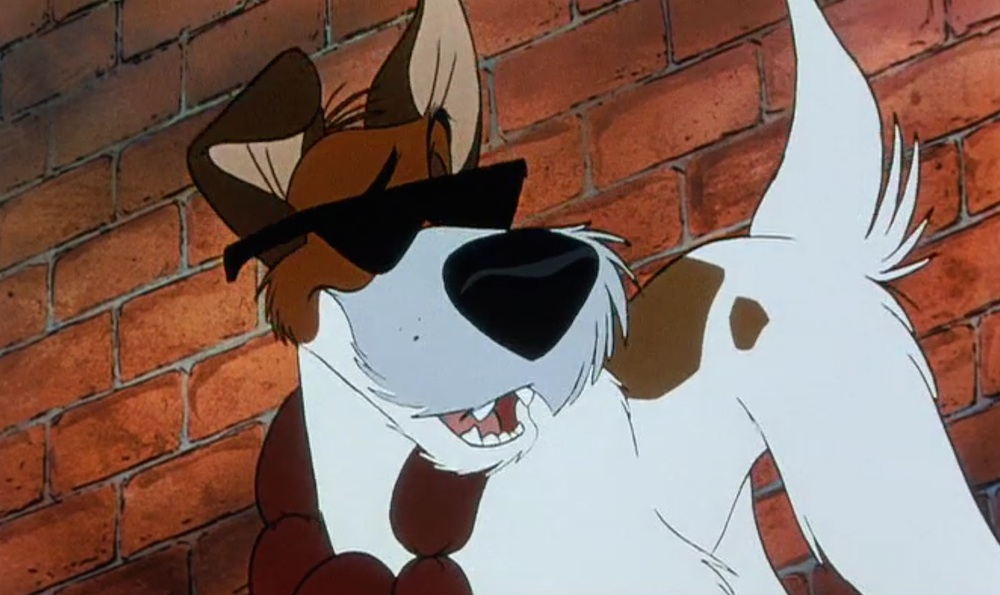 Dodger (Billy Joel), Oliver and Company
Dodger (Billy Joel), Oliver and Company
Power of Excitement Characters are charming thrillseekers who are the life of the party and never think of the consequences of their endless pursuit of pleasure.
In Disney’s animated adaptation of Oliver Twist, streetwise mutt Dodger takes displaced orphan kitten Oliver under his wing. Oliver learns bad habits under Dodger, a dog who shirks responsibility and lives only for his enjoyment. Life is a game to Dodger, and New York City is his playground.
Dodger’s opening musical number “Why Should I Worry? Why Should I Care?” defines his carefree character, and demonstrates the other side to dogs as pets. They are Power of Excitement characters because they live only for what gives them joy.
Power of Ambition
Nick (Jason Bateman), Zootopia/Zootropolis
Zootopia is, if you’ll pardon the pun, a very different beast to the other movies featured on this list. The film takes place in a world of animals, as opposed the human world which features animals interacting with humans.
Power of Ambition characters are eager to gain approval or impress others with a false front. They can never be themselves because they are constantly trying to be something else. These Characters can be Salesmen or Con Artists, like Sly Fox Nick.
Foxes are cunning animals that slink away from trouble, and Nick is very much of that mind. When he is caught up in a conspiracy that threatens the whole of Zootopia, he is still only interested in escaping police custody, making a quick buck, and going back to his old ways.
Power of Conscience
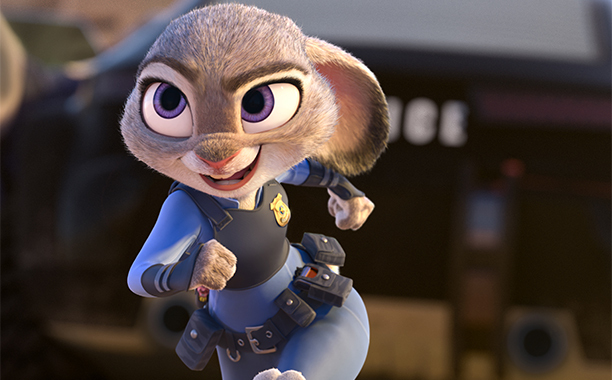 Judy Hopps (Ginnifer Goodwin), Zootopia/Zootropolis
Judy Hopps (Ginnifer Goodwin), Zootopia/Zootropolis
Power of Conscience Characters believe that they know exactly what is right and what is wrong. They operate by their own moral compass and think others should live up to a similar high moral standard. These characters will do anything to expose injustice or corruption
Rabbit Judy Hopps is the driving force behind Zootopia. She uncovers the problem at the heart of the movie and sets most of the major events of the plot in gear. She has always had to fight for what she believes in. Everyone else in the police force underestimates her due to her size and her species.
Judy has no personal life because she is dedicated to upholding the law, even when everyone tells her she isn’t good enough to do so. She is undoubtedly a force for good in the film, but skewers on the more neurotic side of the spectrum. She is uptight, critical, and immediately bristles at her unwilling partner, Nick.
Power of Idealism
 Remy (Patton Oswalt), Ratatouille
Remy (Patton Oswalt), Ratatouille
Power of Idealism characters are never satisfied. They are forever reaching for perfection, even though they can never achieve it. They want to indulge in life’s luxuries because everything else is below them. They see life as one big drama, full of highs and lows, with nothing in between.
Remy is introduced to the audience as a character unhappy with his lot, who wants to reach far beyond his station. He is fed up with living and eating like the rest of his rodent brethren.
Living in Paris, Remy wants to be a gourmet chef in the culinary capital of the world. His species is a terrible setback. If he were any other animal, it might just be feasible to be a chef. The stigma of being an “dirty rat” propels him onward to achieve his dream.
Remy finds a vessel for his craft in bumbling human kitchen boy Linguine (Lou Romano). Remy manipulates the boy to set the restaurants of Paris alight with talent and creativity. Ratatouille is a great animal Power of Idealism story.
Power of Reason
 Rabbit (various), Winnie the Pooh
Rabbit (various), Winnie the Pooh
Power of Reason characters value logic above all else. The world is a series of puzzles that must be solved, and everything must have a rational answer. Any deviation from order and fact will result in chaos.
The fun-loving inhabitants of the Hundred-Acre Wood, Winnie the Pooh, Tigger, and Piglet, upend Rabbit’s need for peace and sanity with their anarchy and disorder. Their antics are a burden on Rabbit’s life. In his ideal world, he would be left alone to farm his carrots and live the quiet life. His neighbor’s problems and turmoil will never allow this.
Rabbit is similar to his real-life animal counterparts. He is twitchy and forever on guard. Rather than this being a survival instinct, it is because he is forever aware that his friends will disrupt his peace and orderly approach to life.
Power of Truth
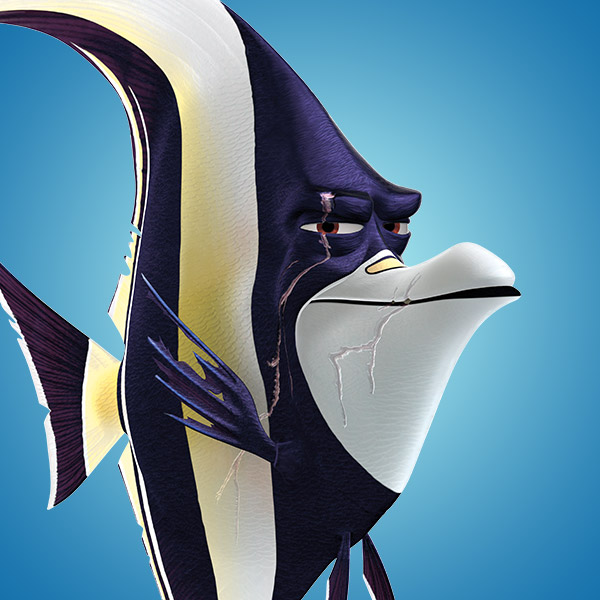 Gill (Willem Dafoe), Finding Nemo
Gill (Willem Dafoe), Finding Nemo
Power of Truth characters are paranoid, forever on the lookout for enemies and traps that might betray them. They are distrustful and uneasy about everything. They occupy themselves with trying to uncover slights and solve mysteries. These characters are often Detectives or Neurotics.
Gill is a fish who has been through a lot- his scars tell a story about why he distrusts humans and believes that there is a conspiracy surrounding the fish tank he is stuck in. He is acutely aware his life is under threat by the dentist who imprisoned him.
It’s amusing to see such a bitter, jaded character in a children’s film. Perfectly by Willem Dafoe, Gill seems more like a grizzled Private Eye or conspiracy theorist than an Angelfish in a Fish Tank. Gill’s paranoia is justified. He knows every inch of the tank in which he is trapped, and uses it to his advantage to escape.
For more examples of all the character types, you can purchase my in-depth e-books at the ETB shop, or you can read more articles on all the “Power Of…” types including James Bond, Doctor Who, Batman and Sherlock Holmes, every Tuesday. There are also 9 pinterest boards full of character examples online. Check them out and let us know at [email protected] if you have any other suggestions.
]]>
 There is an old joke that has all the Studios bringing an Anti-Trust lawsuit against Pixar for Unfair Competition— because all Pixar’s movies are so good!
There is an old joke that has all the Studios bringing an Anti-Trust lawsuit against Pixar for Unfair Competition— because all Pixar’s movies are so good!
Pixar won the 2009 Oscar for Best Animated Feature with Up. All seven Pixar films released since the creation of the category have been nominated. Five have taken home the Oscar: Finding Nemo, The Incredibles, Ratatouille, WALL-E, and Up. Three of those five Oscar winners— Up, The Incredibles and Ratatouille— are Power of Idealism films.
The protagonist in Power of Idealism film wants to stand out from the crowd, to be unique or special or to live an extraordinary life. These characters often play the role of the rebel, the romantic, the outsider, the iconoclast, the artist, or the maverick. Power of Idealism stories are about rebellion, loss, longing and transcendent love.
The protagonist in Up is curmudgeonly Carl (Ed Asner), the last stubborn holdout in a large urban renewal scheme. His beloved wife is dead and he seemingly has nothing to live for. When he defends his home with his cane, actually drawing blood from a construction worker, Carl is legally ordered into a retirement home. Instead, he makes an extraordinary and dramatic escape. But let’s back up a little.
The film begins in the era of newsreels and the amazing derring-do of movie serials. These 1930’s stories are filled with exotic adventures and handsome heroes who conquer far-off lands to bring back strange and exciting discoveries.
As a little boy, Carl is mesmerized by fantastic tales about the famous explorer, Charles Muntz (Christopher Plummer). The newsreels show Muuntz celebrated and lionized and then humiliated. The skeleton of Muntz’s greatest discovery, a large flightless bird from the wilds of South America, is denounced as a fake. As Carl walks home from the movies, he longs to be a legendary explorer. He imagines a crack in the sidewalk to be a yawning canyon and leaps it in a single bound while an imaginary newsreel breathlessly narrates his “great adventure.”
 Pixar’s The Incredibles tackles some of the same themes about what it is to be ordinary and what it is to be extraordinary. Stripped of his status, Mr Incredible (Craig T. Nelson), is in the government equivalent of the witness protection program for decommissioned superheroes. He is stuck in a boring, dead-end desk job.
Pixar’s The Incredibles tackles some of the same themes about what it is to be ordinary and what it is to be extraordinary. Stripped of his status, Mr Incredible (Craig T. Nelson), is in the government equivalent of the witness protection program for decommissioned superheroes. He is stuck in a boring, dead-end desk job. Ratatouille is about an adventurer of a different kind— a rebellious and artistic mouse gourmet. “There’s something about humans, they taste. . . . They discover!” realizes Remy (Patton Oswalt). Rejecting the usual diet of garbage, French country rat Remy decides that in order to eat as well as humans he needs to learn to cook.
Ratatouille is about an adventurer of a different kind— a rebellious and artistic mouse gourmet. “There’s something about humans, they taste. . . . They discover!” realizes Remy (Patton Oswalt). Rejecting the usual diet of garbage, French country rat Remy decides that in order to eat as well as humans he needs to learn to cook.Gusteau: (appearing as illustration in a cookbook) If you are hungry, go up and look around, Remy. Why do you wait and mope?Remy: Well, I just lost my family. All my friends. Probably forever.Gusteau: How do you know?Remy: Well, I… You are an illustration. Why am I talking to you?Gusteau: You just lost your family. All your friends. You are lonely.Remy: (sarcastically) Yeah, well you’re dead.Gusteau: Ah, but that is no match for wishful thinking. If you focus on what you left behind. You will never be able to see what lies ahead. Now go, get up and look around.
… (T)here are times when a critic truly risks something, and that is in the discovery and defense of the new. The world is often unkind to new talent, new creations, and the new needs friends. Last night, I experienced something new, an extraordinary meal from a singularly unexpected source. To say that both the meal and its maker have challenged my preconceptions about fine cooking is a gross understatement. They have rocked me to my core. In the past, I have made no secret of my disdain for Chef Gusteau’s famous motto: “Anyone can cook.” But I realize, only now do I truly understand what he meant. Not everyone can become a great artist, but a great artist can come from anywhere. It is difficult to imagine more humble origins than those of the genius now cooking at Gusteau’s, who is, in this critic’s opinion, nothing less than the finest chef in France. I will be returning to Gusteau’s soon, hungry for more.
 I have been silent on the blog these last few days because I’ve been struggling with a terrible cold. Not a pleasant way to spend a romantic holiday in Paris with my husband (he’s been sick too)– but there you have it. It’s a good thing we are staying with loving family members who have taken good care of us.
I have been silent on the blog these last few days because I’ve been struggling with a terrible cold. Not a pleasant way to spend a romantic holiday in Paris with my husband (he’s been sick too)– but there you have it. It’s a good thing we are staying with loving family members who have taken good care of us.
I am now preparing for a television show I’ll be working with in Europe. I just received a bio which describes a new character soon to be added to the show’s ensemble. It is a male character, a father, whose greatest fear is described as the terror that something might happen to his daughter.
When I first developed the Character Map I asked writers “What is your biggest fear?” This kind of answer would often come up. As adults we often fear most for those we love, especially our children.
I realized this was the wrong way to ask the question. I then asked “What was your biggest worry as a child?”
This question yielded much more useful answers. How do we turn around the character’s natural fear about a child’s welfare into something more specific to that particular character?
We must look at the ways the character is most worried about failing others and becoming unloved or unlovable. This often is traceable back to the character’s own childhood fears. These early fears powerfully stay with us and color our adult lives.
The question to ask the character (a father) in this case is– “How do you fear you might be the cause of something terrible happening to your child?”
This makes the fear specific and personal and keys it directly to the Character Type. Here are some examples:
I fear I am not strong enough to protect my child. If I show any weakness my family might be exposed to danger. This is at the root of the fear for a Power of Will father (like Tony Soprano on The Sopranos).
I fear I am not good enough to protect my child. If I don’t judge correctly or make bad choices my family might be exposed to danger. This is at the root of the fear for a Power of Conscience father (like Coach Eric Taylor on Friday Night Lights).
I fear I am not cautious enough to protect my child. If I don’t see all the hidden dangers my family might be exposed to danger. This is at the root of the fear for a Power of Truth father (like the father fish, Marlin, in Finding Nemo).
I fear I am not extraordinary enough to protect my child. If I don’t act with honor and heroism my family might be exposed to danger. This at the root of the fear for a Power of Idealism father (like William Wallace in Braveheart).
I fear I am not objective enough to protect my child. If I don’t act rationally my family might be exposed to danger. This at the root of the fear for a Power of Reason father (like Dr.Matt Fowler in In the Bedroom)
I fear I am not successful enough to protect my child. If I don’t have enough money my family might be exposed to danger. This is at the root of the fear for a Power of Ambition father (like Fletcher Reed in Liar Liar)
I fear I am not responsible enough to protect my child. If I don’t have enough maturity my family might be exposed to danger. This is at the root of the fear for a Power of Excitement father (like Samuel Faulkner in Nine Months).
I fear I am not useful enough to protect my child. If I my family doesn’t realize I know best they might be exposed to danger. This is at the root of the fear for a Power of Love father (like Stanley Banks in Father of the Bride).
I fear I am not significant enough to protect my child. If I am too simple my family might be exposed to danger. This is at the root of the fear for a Power of Imagination father (like Guido Orefice in Life is Beautiful).
The trick is to make the fear personal to the character and fit the Character Type. Simply fearing for a child is too general. The fear must speak directly to the character’s own Worldview, View of Love and how one protects and cherishes those one loves. Or how specifically one might fail to do so.
]]>